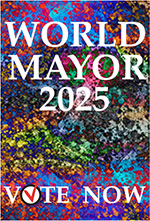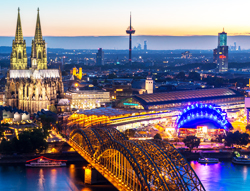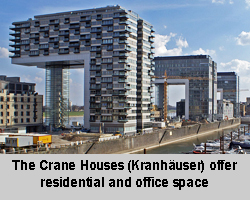
 |
WORLD MAYOR 2018
Essays by World Mayor finalists In a series of personal essays, the finalists for the 2018 World Mayor Prize describe the reasons that motivated them to enter politics, the challenges they face as mayors and how they envisage their towns and cities to develop and prosper in the future. They stress the importance of women in politics and urge young women always to aim high. |
|
| FRONT PAGE About World Mayor City Mayors Foundation   WORLD MAYOR 2018 • Results 2018 • Project 2018 • Shortlist 2018 • Longlist 2018 • Raison d'être • World Mayor history • World Mayor Prize • Code of Ethics • Criteria • Meet the Press INTERVIEWS WITH • Mayor of Ancona • Mayor of Doncaster • Mayor of Rennes • Mayor of Zamboanga ESSAYS BY • Mayor of Ancona • Mayor of Cologne • Mayor of Doncaster • Mayor of Fort Worth • Mayor of Lille • Mayor of Paris • Mayor of Rennes • Mayor of Saarbrücken • Mayor of Trbovlje • Mayor of Tunis • Mayor of Zamboanga TESTIMONIALS • Mayor of Alphen / Rijn • Mayor of Ancona • Mayor of Baden-Baden • Mayor of Calais • Mayor of Chemnitz • Mayor of Cologne • Mayor of Cozumel • Mayor of Doncaster • Mayor of Fort Worth • Mayor of Grand Rapids • Mayor of Lille • Mayor of Lodz • Mayor of Molenbeek • Mayor of Narayanganj • Mayor of Oakland • Mayor of Omaha • Mayor of Paris • Mayor of Rennes • Mayor of Reutlingen • Mayor of Saarbrücken • Mayor of San Juan • Mayor of Trbovlje • Mayor of Tunis • Mayor of Zamboanga • Mayor of Zurich PROFILES OF • Mayor of Ancona • Mayor of Cologne • Mayor of Doncaster • Mayor of Fort Worth • Mayor of Lille • Mayor of Paris • Mayor of Rennes • Mayor of Saarbrücken • Mayor of Trbovlje • Mayor of Tunis • Mayor of Zamboanga WORLD MAYOR 2016 WORLD MAYOR 2014 WORLD MAYOR 2012 WORLD MAYOR 2010 WORLD MAYOR 2008 WORLD MAYOR 2006 WORLD MAYOR 2005 WORLD MAYOR 2004 |
 Essay by Henriette Reker Essay by Henriette RekerMayor of Cologne, Germany It was a women – empress Agrippina – that brought Cologne to full blossom during the Roman Empire. But a further 2,000 years had to pass by for our city’s political and economic affairs to again lie in the hands of a women. As mayor of a great metropolis I am well aware that it took the long course of women’s movement to enable me to demonstrate my personal commitment towards my hometown. Over one million people live in Cologne today. They are faced with numerous issues: A strong population growth as well as shifting age structures, climate change and climate protection measures, new mobility demands, digitalisation and skills for a transforming economy to name but a few. The related enormous challenges that need to be addressed are in particular the provision of adequate and affordable housing, the extension of a sustainable mobility infrastructure, the creation of equal education opportunities and access to equitable financing for all generations. This will only be successful if it is based on a strong social cohesion, a common political culture and an efficient administration. Furthermore, it will depend on every single individual, regardless if they were born here or elsewhere, young or old, seeking refuge or settled down in their new home country. Entrepreneur or worker – we cannot and will not be able to afford to have our children and families and even complete city quarters being left behind. All of them matter to me when it comes to the development of our growing city. This development carries with it a particular responsibility. As a metropolis, Cologne belongs to a group of key players dealing with the global challenges of the 21st century, be it climate protection, fair trade or the strengthening of human rights. Cities are not only the source of major problems such as the emission of greenhouse gases. They are also essential in coming up with solutions by managing the consumption of resources with the help of planning and regulatory measures. We have accordingly adopted the United Nation’s Agenda 2030 and are developing an urban strategy that will guarantee a sustainable growth over the coming years. One crucial issue and at the same time a huge opportunity is the integration of refugees. We are providing support to them, enabling them to become committed members of our democratic society. Cologne is very fortunate in that we are well aware of our local identity. This is a statement far removed from carnival cheering and folklore. If the citizens of Cologne were not so familiar with our city’s long history and thus what we are all about, the ice-cold wind of extremism would blow in our face. It should not be taken for granted that this is not the case. Whilst 2,000 years ago and again during the Middle Ages our city’s fortifications protected us against enemies, it is today our disposition that protects us against hostilities. And this mindset, this positive attitude towards life needs to be nurtured, each and every day.  Aufsatz von Henriette Reker Aufsatz von Henriette RekerOberbürgermeisterin von Köln Es war eine Frau, die Colonia zu großer Blüte im römischen Reich verhalf: Kaiserin Agrippina. Es mussten weitere 2.000 Jahre vergehen, bis die Geschicke dieser Stadt erneut in der Hand einer Frau liegen: Als erste Oberbürgermeisterin einer Millionenmetropole bin ich mir sehr bewusst über den langen Weg der Frauenbewegung, der notwendig war, um mir mein persönliches Engagement für meine Heimatstadt zu ermöglichen. In dieser Stadt leben über eine Million Menschen und vielfältige Veränderungen stehen bevor: Ein starkes Bevölkerungswachstum und Veränderungen in der Altersstruktur, Klimawandel und Klimaschutz, veränderte Mobilitätsbedürfnisse, Digitalisierung und wirtschaftlicher Wandel sind nur einige Beispiele. Die großen Herausforderungen, die damit einhergehen, sind insbesondere ausreichender und bezahlbarer Wohnraum, der Ausbau einer nachhaltigen Mobilitätsinfrastruktur, die Schaffung gleicher Bildungschancen sowie eine generationsgerechte Finanzierung. Dies alles gelingt nur mit einer Stärkung des gesellschaftlichen Zusammenhalts, einer politischen Kultur des Miteinanders und einer leistungsfähigen Verwaltung. Und hierbei kommt es auf jeden einzelnen Menschen an – ob hier geboren oder zugewandert, jung oder alt, auf der Flucht oder angekommen in einer neuen Heimat. Ob Unternehmerin oder Arbeiter – wir können und wollen es uns nicht leisten, unsere Kinder und Familien im Regen stehen und ganze Stadtteile zurück zu lassen. Mir kommt es auf alle an, wenn es um die Entwicklung unserer wachsenden Stadt geht. Eine Entwicklung, die zugleich eine besondere Verantwortung mit sich bringt: Als Großstadt zählt Köln zu den zentralen Akteuren, um die globalen Herausforderungen des 21. Jahrhunderts zu bewältigen – sei es im Klimaschutz, beim fairen Handel oder bei der Stärkung von Menschenrechten. Denn in den Städten entstehen nicht nur die großen Probleme wie etwa der Klimagasausstoß. Hier liegt auch der Schlüssel für die Lösungen, indem der Ressourcenverbrauch durch Planung und Regulierung gesteuert wird. Daher haben wir uns zur Agenda 2030 der Vereinten Nationen bekannt und entwickeln eine Stadtstrategie, die ein nachhaltiges Wachstum in den nächsten Jahren gewährleisten wird. Eine zentrale Herausforderung und große Chance ist die Integration geflüchteter Menschen, die wir darin unterstützen, engagierte Mitglieder in der Mitte unserer demokratischen Gesellschaft zu werden. Köln hat das große Glück, dass wir uns unserer Identität sehr bewusst sind. Ich sage das fernab von jedem Karnevals-Jubel und Folklore. Wenn sich unsere Stadt ihrer Geschichte, also dem, was sie ausmacht, nicht so bewusst wäre – dann würde auch uns der eiskalte Wind des Extremismus ins Gesicht schlagen. Dass dies nicht so ist, ist aber keine Selbstverständlichkeit. War es vor 2000 Jahren und im Mittelalter unsere Stadtmauer, die uns vor Feinden geschützt hat, so ist es heute unsere Haltung, die uns vor Anfeindungen schützt. Und diese Haltung, diese Einstellung zum Leben müssen wir stärken. Jeden Tag! |